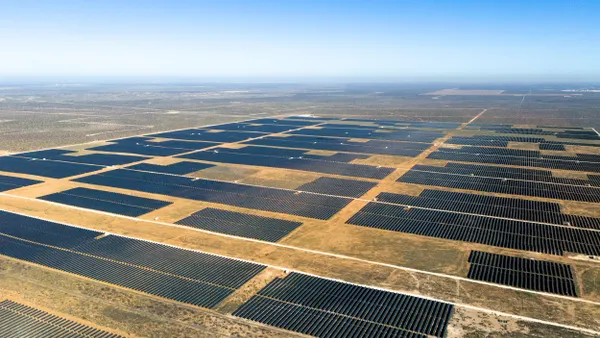Dive Brief:
- Michigan Administrative Law Judge Sally Wallace ruled on Dec. 23 that DTE Energy's Integrated Resource Plan (IRP) is flawed, citing multiple reasons the proposal doesn't comply with state law.
- Wallace sided with several IRP intervenors and asked the Michigan Public Service Commission (PSC) to direct the utility to issue a Request for Proposals (RFP) to gauge renewable energy prices more accurately. She interpreted a 2016 law on long-term utility planning to have an RFP requirement for every IRP.
- Regulators will make the final decision this spring, after stakeholders have an opportunity to respond to the judge's ruling. PSC staff recommended the approval of the IRP in November, despite reservations.
Dive Insight:
The ALJ is one of many critics in the IRP process of the utility's plan, which witnesses say uses incorrect, higher prices for renewable energy, underselling clean energy resource opportunities to keep coal units active for longer.
DTE has more coal assets than the other large investor-owned utility (IOU) in the state, Consumers Energy. The PSC approved Consumers' IRP this summer, which puts the utility on course to eliminate coal entirely by 2040.
Both IOUs committed to clean energy goals in 2018, following pressure for a ballot initiative to require companies to get their energy from renewable resources, but "Consumers had a lot more flexibility," because they did not build new gas capacity to replace coal, Charlotte Jameson, energy director of the Michigan Environmental Council, told Utility Dive.
"Consumers moved a little bit earlier and a little bit more aggressively to retire coal plants," she added. "DTE is still very heavily coal dependent, and so a lot of their IRP, I think, was just figuring out what to do with these coal plants."
Consumers did issue an RFP for renewable resources leading up to its IRP, complying with the 2016 law and, according to clean energy advocates, using more accurate estimates for wind and solar costs.
The ALJ also recommended a complete analysis of distributed generation resources in DTE's next IRP. DTE had argued that it did not issue an RFP for additional capacity resources because there was "no near-term persistent capacity need."
The ALJ argued that the long-term plan therefore didn't comply with the legal requirements for IRP planning in the state. "DTE’s starting point, which included significant amounts of unapproved, nonoptimized resources over the entire planning period does not comply with" state law, Wallace wrote, referring to coal and gas units that will be subject to reevaluation in the next IRP.
Wallace said DTE should determine its mean absolute percentage error on monthly energy sales and peak load, changing the prediction accuracy of its forecasting, and use a shorter historical period for weather normalization to take into account current weather patterns in its next IRP, per the recommendations of Michigan PSC staff Olumide Makinde. DTE had previously responded that it will evaluate Makinde's recommendations and possibly implement them in 2021.
"We are thoroughly evaluating the Administrative Law Judge’s (ALJ) recommendation in preparation for filing our response," Micah Ragland, DTE corporate communications director, said in a statement.
Makinde also recommended DTE increase the granularity of data in its regression models. DTE said in may not be able to update its forecasting models in time for its next IRP to increase granularity.
New PSC Commissioners stepping up to bat
The PSC's decision is highly anticipated in this case, and the result hinges on the support of two new Democratic commissioners appointed this year by Michigan Gov. Gretchen Whitmer, D.
Commissioners Dan Scripps and Tremaine Phillips have made public statements pushing utilities to consider low income ratepayers in their planning and integrate more renewable energy, according to Jameson.
Most notably, they sided with intervenors like clean energy and ratepayer advocates in December, against PSC staff recommendation, to deny the construction of a 20 MW natural gas unit by Upper Peninsula Power, in the utility's 2019 IRP.
In addition to DTE's IRP, the utility has a ratecase open which includes an increase for the Blue Water Energy Center, a new gas plant that began construction in 2018. As the official ratepayer advocate, the Michigan Environmental Council is working to push back on DTE's rate increase request related to the gas plant, Jameson said.
"We have a few more decisions coming out of the Commission, and we'll have a much better sense of where they're headed," she added.
CORRECTION: A previous version of this article misidentified the intervenors on Upper Peninsula Power's IRP. Michigan Environmental Council was not an intervenor.














